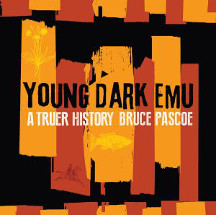Young dark emu, a truer history by Bruce Pascoe

Magabala books, 2019. ISBN: 9781925360844.
(Age: 10+) Highly recommended. Non-fiction. Pascoe's revelatory book
Dark
emu, black seeds has now been made into a simplified
illustrated hardback version for younger readers - allowing a
younger audience to also learn of Pascoe's research into the
agricultural practices of Australian Aboriginal people. Pascoe draws
on historical records and artefacts to piece together a picture of
Aboriginal settlement before the arrival of Europeans, and contrary
to the long held view of the 'hunter-gatherer' existence that suited
the colonialists' idea of an 'empty' land, he reveals the existence
of Aboriginal farming and land care, permanent settlements with
houses and storage buildings, and complex aquaculture management
systems.
Teachers will welcome this book as an excellent example to show
students learning how to research primary sources for their
projects. Pascoe includes extracts from many original nineteenth
century colonial diaries and reports, and he revaluates the artwork
of colonial artists who showed cultivated fields in their paintings,
once dismissed as an English romanticising of the Australian
landscape. He urges the putting aside of preconceptions and
interpreting with a new eye the original materials. 'It is a
different way of looking'. Thus the so-called 'humpy' was actually a
substantial construction that could accommodate many families, the
'lazy' fisherman had actually engineered an ingenious fishing
machine, and fire was not a threat but a useful tool for tilling and
cultivating pastures.
Pascoe has collected the evidence to present the case that the
Aboriginal way of life actually met all the criteria of an
established agricultural society that lived in harmony with their
environment. This is not what the colonialists wanted to see, in
their quest to occupy new land. And it is evidence that was
destroyed as they took possession, and introduced their livestock.
This is an important book in the study of Australian history - it
provides a new perspective to be read and discussed. It needs to be
on every teacher's reading list and in every school library.
Helen Eddy